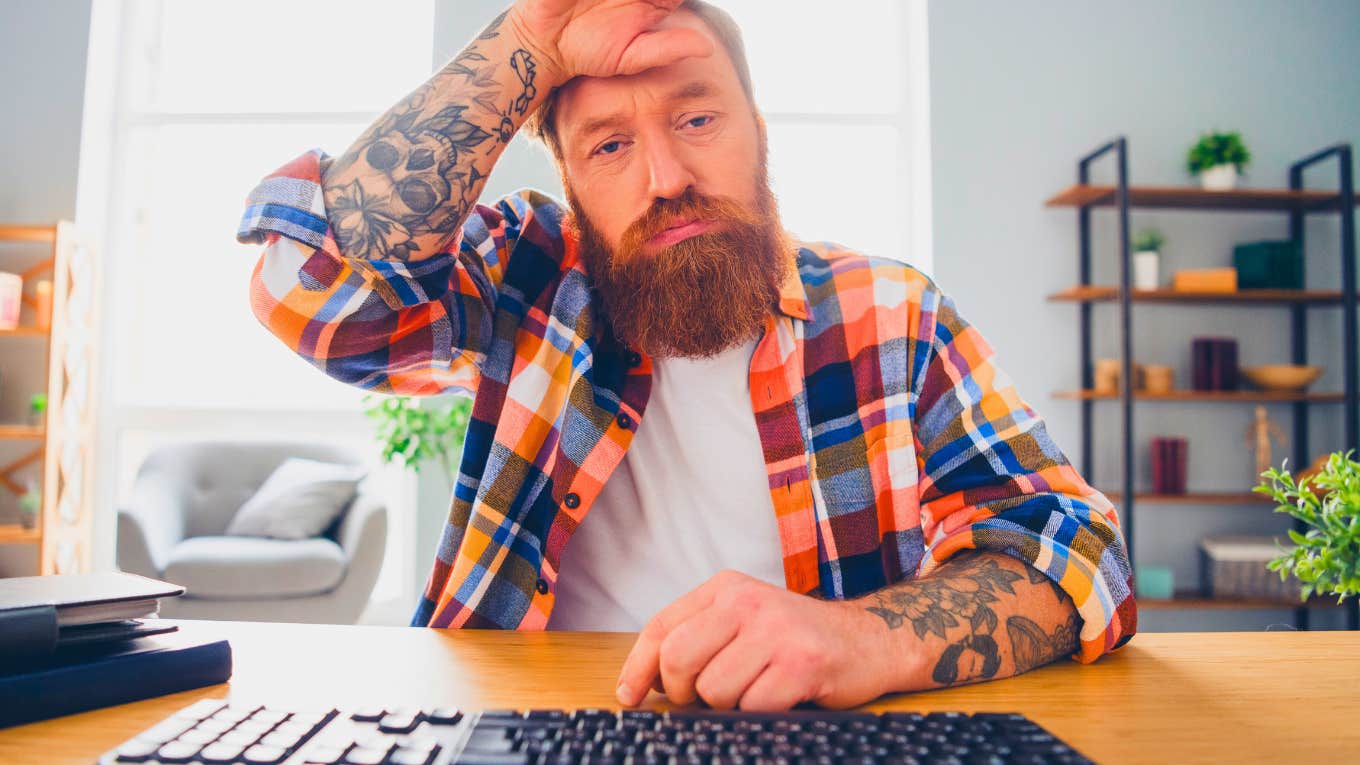11 Things Adults With Actual Jobs Are Tired Of At This Stage Of Their Lives
The 9-to-5 life gets exhausting.
 Roman Samborskyi / Shutterstock
Roman Samborskyi / Shutterstock Especially for adults who don’t have healthy coping skills or stress-relieving rituals, the chaos of everyday life can be emotionally draining. From navigating the stressors of a professional career to balancing personal obligations and a million other responsibilities at home, it’s no surprise that emotional exhaustion and burnout rates are at an all-time high for the majority of American workers.
Many of the things adults with actual jobs are tired of at this stage in their lives seem typical on paper, like financial stressors, family life responsibilities, work-life balance concerns, and heavy corporate workloads. However, in today's world, with numerous new concerns and less free time to focus on personal well-being, it can be even more challenging to juggle all these things simultaneously.
Here are 11 things adults with actual jobs are tired of at this stage of their lives
1. Making work their entire life
 Drazen Zigic | Shutterstock.com
Drazen Zigic | Shutterstock.com
Even if they know it’s not healthy, many adult workers today can’t help but make their career and work-life their entire identity. They spend so much time at work and put so much effort into their careers, sometimes for security and stability, rather than true meaning, that it ingrains itself in their personality.
However, of course, having a sense of self-concept, purpose, and passion outside of work in their personal time is incredibly important for well-being. In addition to personal health, people with authentic lives and personal hobbies or passions also tend to boast healthy relationships and social connections.
That’s why this demanding nature of work, even at home and in their personal lives, is one of the things adults with actual jobs are tired of at this stage in their lives. They’re yearning for deeper meaning, quality time, and solitude on their own accord.
2. Having to be available 24/7
 Voronaman | Shutterstock.com
Voronaman | Shutterstock.com
From bringing work home to answering emails on their personal phone, and feeling chronically stressed about work in their personal lives, these are some of the things adults with actual jobs are tired of at this stage in their lives. Everything revolves around work, even when they’re actively trying to rest or be present with their families.
Especially for people who work from home, setting boundaries around screen time and work-life balance can be even more difficult. Their couch is where they take their afternoon meeting, and their bed is where they start their day, so of course, turning off “work mode” and resting in their personal space feels much more difficult on a day-to-day basis.
3. Feeling guilty for taking breaks
 Leny Studio | Shutterstock.com
Leny Studio | Shutterstock.com
According to a study published in PLOS One, taking breaks at work and regularly prioritizing rest during the workweek are all incredibly important for boosting employee well-being and health, but also for ensuring they’re productive in the office.
However, many workers today are feeling consistently overworked without rest by their employers, feeling guilty for taking days off or resting during the workday at all. Even when they’re actually sick, coming into the office feels like the expectation, so it’s no surprise that these are some of the things adults with actual jobs are tired of at this stage in their lives.
4. Being shamed for taking time off
 Fizkes | Shutterstock.com
Fizkes | Shutterstock.com
Whether it’s taking a vacation or simply leaving early when they’re feeling tired, being shamed for taking time off is one of the things adults with actual jobs are tired of at this stage of their lives.
While their bosses may believe that creating barriers to taking time off will boost productivity and time spent in the office, a study published in the Journal of Applied Psychology suggests that it actually urges employees to cut corners. Not only are they at a heightened risk of burnout that negatively impacts work productivity, but they’re also imbued with resentment toward their work for making work-life balance impossible to achieve.
5. Overusing corporate jargon with no meaning
 PeopleImages | Shutterstock.com
PeopleImages | Shutterstock.com
Many young professionals are actively turning away from and demonizing corporate jargon, not just because it’s overly complicated and exclusive to new workers, but it generally holds no real purpose. It’s a figment of misguided “professionalism” that truly makes work more complicated, for no reason.
That’s why clear, simple, and concise language is often what intelligent professionals prioritize on an everyday basis. They’re tired of corporate jargon that’s exclusive and complex for no reason, and often yearn for a kind of connection and simplicity that normal language provides.
6. Feeling physically exhausted all the time
 Josep Suria | Shutterstock.com
Josep Suria | Shutterstock.com
When you start your day by grabbing your phone to look at a work email or even ruminate late at night about the upcoming workday, it’s no surprise that you’re emotionally and physically drained all the time. No matter how much sleep you get, you’re always tired.
For many people, this is a symptom of having poor work-life boundaries and balance. They’re not taking the time they need to rest regularly and putting work responsibilities on a pedestal above their personal needs. That’s why it’s something adults with actual jobs are tired of at this stage in their lives, both literally and metaphorically.
7. Dealing with relationship strains
 MAYA LAB | Shutterstock.com
MAYA LAB | Shutterstock.com
A 2023 study argues that work stress and turmoil often negatively affect the health and satisfaction of personal relationships at home, whether it’s with friends, kids, or a spouse. That’s why disconnecting from anxiety about work and stress from the workday in personal spaces is so essential for personal well-being.
However, many adults with real jobs struggle with prioritizing quality time with their families when work gets overwhelming, or even being distracted by their phone and its connection to the workplace when they’re “relaxing” at home. They’re tired of experiencing tension and strain in their relationships, even if they don’t necessarily tie their disconnection and internal irritability to work stress and frustration.
8. Losing touch with their hobbies
 Jestercine | Shutterstock.com
Jestercine | Shutterstock.com
Experts from Harvard Health are clear about the benefits of hobbies, arguing that they not only boost personal self-esteem and identity but also create space for stress relief at home. Whether it’s making art and leaning into creativity, working out with intention, or making space for social events that energize us, these are the things that truly add meaning and purpose to our lives.
However, when we’re working too much or shouldering anxiety about stress at work, it’s often these moments of personal time and hobbies that are overlooked first. We consider them to be “wants,” rather than “needs,” and put them on the back burner.
Yet, overlooking this time for personal space and intention with hobbies is one of the things adults with actual jobs are tired of at this stage in their lives. They’re tired of their entire life revolving around work without the purpose and intention of hobbies, alone time, and connection at home.
9. Working hard with little recognition or reward
 MAYA LAB | Shutterstock.com
MAYA LAB | Shutterstock.com
When employees feel appreciated, secure, and praised, they are often at a lower risk for experiencing burnout and feeling exhausted in the workplace, at least according to a study published in PLOS One. Whether it’s financial compensation in exchange for hard work or being praised for intentional effort by a boss, these are the things that make working meaningful, motivating, and empowering.
However, many adults today are chronically overworked and underappreciated, suffering from burnout from tangible workloads, but also from yearning for acknowledgment by their peers and co-workers in the office.
10. Comparing their lives to social media
 TetianaKtv | Shutterstock.com
TetianaKtv | Shutterstock.com
According to a study published in Frontiers in Psychology, increased social media use often enhances draining career frustrations. Whether it’s shouldering emotional turmoil and energy drains from doomscrolling or actively comparing your life and career to people’s highlight reels on Instagram, these are some of the things adults with actual jobs are tired of at this stage in their lives.
Self-esteem is a huge part of how we work and how we craft our mindset in life, but when we’re always on social media comparing and distracting ourselves, it drains our self-confidence and assuredness.
11. Wasting time with meetings that could’ve been emails
 SeventyFour | Shutterstock.com
SeventyFour | Shutterstock.com
According to a study from Atlassian, more than 75% of workers feel drained and exhausted on days when they have a lot of meetings. Not only is the interaction and social aspect of meetings, whether they’re online or in person, often draining at work, but they also take up a ton of time that distracts from responsibilities and tasks already on workers’ plates.
So, they’re either coping with stress about not finishing their responsibilities or staying later at the office to catch up after spending the majority of the day in meetings.
Zayda Slabbekoorn is a staff writer with a bachelor’s degree in social relations & policy and gender studies who focuses on psychology, relationships, self-help, and human interest stories.

